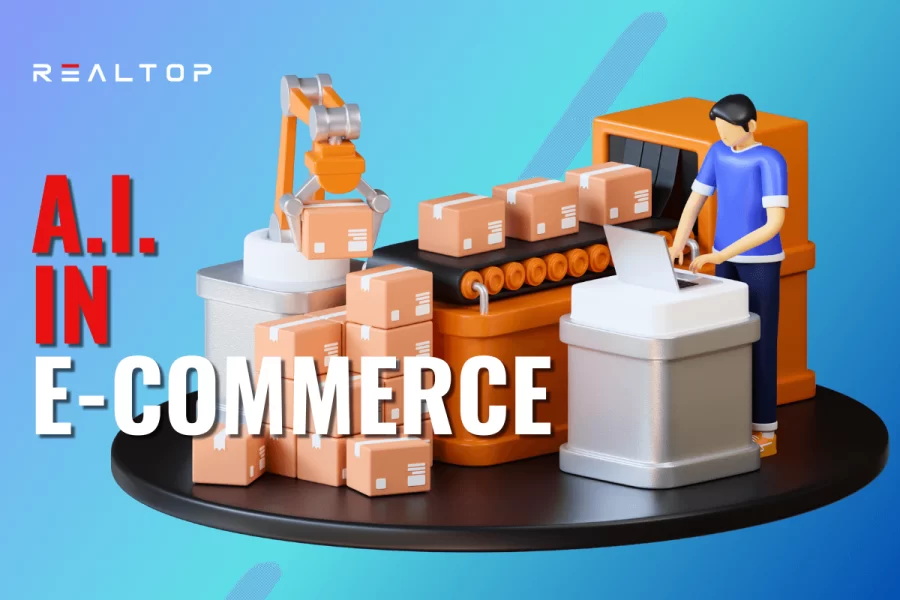
In a world where technology is evolving at a fast pace, there’s one that has been impacting ecommerce businesses significantly, artificial intelligence.
Imagine a world where machines not only understand human preferences but predict them. If you own an ecommerce business, brace yourself cause this is happening currently. From digital assistants seamlessly guiding us through online shopping journeys to businesses fine-tuning their strategies with efficient customer data collection and interpretation, this is just a tiny intersection between artificial intelligence and e-commerce.
How is AI used in E-commerce?
AI aims to enhance the user experience and ensure that the product they seek satisfies their needs. Anything that sacrifices user experience and delays the time for users to find what they need can negatively affect ecommerce websites, especially in SEO terms.
Below are some ways AI has helped the ecommerce industry prioritize user experience and their needs.
Personalized Shopping Experiences
AI analyzes vast amounts of data from user behavior, purchase history, and preferences to deliver accurate product recommendations. The more accurate the product suggestions are, the more likely it is to increase sales, user engagement, and satisfaction. Studies indicate that businesses that incorporate artificial intelligence in their sales processes experienced a 20% increase in customer engagement, a 10-15% increase in conversion rates, and a 6-10% growth in revenue.
Chatbots and Virtual Assistants
In today’s market, users want an answer as soon as possible at any time of day. 88% of users in 2022 had a conversation with a chatbot at least once, and there was a 67% increase in sales led by chatbots. Bots can answer queries and guide customers through their purchasing journey, resulting in increased customer satisfaction and reduced response time. By handling customer interactions actively with chatbots, you can create a more efficient sales process available 24/7.
Predictive Analytics
AI technology employs predictive analytics to forecast consumer trends and demands. AI tools use algorithms and statistical models to draw accurate inferences by analyzing data patterns. As a result, it can help you anticipate future market shifts, helping businesses stock the right products and optimize inventory management.
Visual Search
Visual search technology enables users to find products by simply uploading images. Once the tool finds matching visual patterns such as colors, shapes, and patterns, it will provide the most accurate range of products to the user that will likely satisfy his needs.
Recommendation Engines
Recommendation engines suggest related products to customers, encouraging upselling and cross-selling in case they cannot find the product they were looking for. For example, imagine a user looking for some men’s blue Nike sports shoes size ten on your website. Unfortunately, you are out of stock for that specific model. However, you have a similar pair of shoes, the same size, and color, but for the Adidas brand, that might match the features and design the user is looking for.
The recommendation engine will automatically display this suggestion to the user looking for Nike sports shoes as an alternative, providing a more personalized shopping experience. If everything runs smoothly, and the Adidas shoes match the user’s wants, you can close a sale even if you don’t have the initial product.
Voice Commerce
Studies indicate that 33.2 million users in the U.S. were expected to buy products using the voice search feature in 2022. This number is only expected to increase in 2023. eCommerce business owners should optimize their websites for voice search to gain a competitive advantage.
Content Generation
Integrating AI in your content production efforts can help you reduce significant time. 52% of marketers currently use AI content generation tools as part of their content marketing strategy. AI can help you generate product descriptions, social media copy, blogs, and other content.
Local Marketing
Imagine you are a Boston-based ecommerce business that wants to target consumers in Brookline and Somerville cities. AI can analyze users’ buying patterns in those areas and learn more about their demographics and needs. With this information, you can formulate targeted strategies that drive better results.
Behavioral Insights
AI analyzes user behavior by what products customers search for, click on, and purchase. For example, you can analyze which of your product pages on your website are the most visited by users and which drive more sales. You can they stock your inventory with the most demanded products.
What are the Benefits of AI in eCommerce?
Increased Sales and Revenue
AI can help optimize marketing campaigns, pricing strategies, and inventory management, eventually leading to more sales and revenue. It can also predict product demand so companies can avoid stockouts or overstocking.
Reduced Costs
AI can help businesses reduce costs in several ways. It can automate customer service, data entry, and inventory management tasks. AI can also identify fraudulent transactions, which can help businesses avoid financial losses.
Improved Customer Experience
AI can create a more personalized and engaging customer experience. For example, it can recommend products to customers based on their past purchases, browsing history, and social media activity. AI can also provide customer support through chatbots.
Will Sales Be Replaced by AI?
Even though AI is changing sales approaches, it will unlikely replace human salespeople anytime soon. AI can automate tasks such as lead generation, qualifying prospects, and scheduling appointments. However, AI cannot replace the human touch essential for building customer relationships and closing deals, such as problem-solving, negotiation, and empathy. AI should be considered a tool for salespeople to perform their job more efficiently and effectively, not a replacement.
What is the Future of AI in e-Commerce?
Hyper-personalization will be crucial as AI leverages data insights on consumer behavior, preferences, purchase, and browsing history to develop tailored shopping experiences and provide the best product recommendations to users.
Artificial intelligence will play a crucial role in supply chain management. It can effectively predict demand fluctuations so businesses can reduce the waste of resources on products that are not worth it. Customer service will also be impacted by the increase of chatbots and virtual assistants that can handle more complex inquiries and assist in the user’s decision-making processes.
Additionally, voice and visual commerce will take center as more voice search commands are performed. Lastly, creativity will be significantly impacted as AI collaborates with designers and marketers by speeding up the production of creative campaigns.
However, will all these changes, it’s important to mention that AI tools will have ethical considerations surrounding data privacy, bias, and transparency to encourage responsible practices and regulations.
How Companies Have Implemented AI in Their Business Processes
Are you still not convinced of the importance artificial intelligence in e-commerce plays for the online shopping world? Let’s check how recognized ecommerce businesses have used AI tools to scale their business processes.
How does Amazon use AI in eCommerce?
Amazon’s recommendation engine uses AI algorithms to analyze user browsing and purchase history. Then, it suggests products that match each user’s preferences based on the data. Amazon’s fulfillment centers also use AI-powered robots for efficient inventory management and order fulfillment, optimizing the supply chain.
How does Shopify use AI?
Shopify integrates AI tools into its platform to provide product recommendations and customer segmentation. Shopify’s Kit helps business owners manage tasks like creating ads, managing social media, and sending emails. The platform uses AI to analyze customer behavior and suggest product pricing strategies. Moreover, its algorithm help predict inventory needs, optimize stock levels, and minimize overstock or understock situations.
How does Walmart use AI in eCommerce?
This retail giant employs AI for demand forecasting and inventory optimization, ensuring products are available when and where they’re needed. AI-powered cameras monitor store shelves to track inventory levels and detect out-of-stock items in real-time. Walmart’s website’s recommendation systems also provide a personalized online shopping experience based on each user’s needs.
AI Tools for eCommerce
If you are wondering which AI tools you can use to improve your online business processes, here are some you can start with.
Personalization
Octane AI
Octane AI is a personalization tool that collect customer preferences and browsing history data to make personalized product recommendations.
ViSenze
ViSenze is a visual search tool used to create virtual fitting rooms, make product recommendations, and even improve your website’s search functionality.
Customer Service
LiveChatAI
LivechatAI is a chatbot tool that will allow you to simulate human conversations. This can provide customer service 24/7, answer product questions, and even make sales.
Landbot
Landbot is another great chatbot tool but with an extra touch that allows the creation of interactive landing pages used to collect leads, promote products, and even generate sales.
Inventory management
Extensiv
Extensiv is an inventory management tool with extra features that allow you to set up reorder points and track shipments in real-time.
Marketing
Frase.io
Frase.io is an AI tool that helps you write SEO-optimized content that ranks well on search engines. It compares website data such as word count, keyword variations, heading structure, and competition level.
SEMrush
SEMrush implements AI to provide comprehensive SEO and digital marketing insights such as competitive analysis, keyword research, backlink tracking, and site auditing tools.
Conclusion
AI applications in ecommerce are continuously altering how we conduct business. Artificial intelligence has transformed the online business world by increasing customer support, personalizing shopping experiences, and optimizing marketing strategies. If you wish your business to remain competitive, combine artificial intelligence and ecommerce to drive more sales, reduce costs, improve customer experiences, and handle more efficient operations.
RealTop uses the most recent AI tools to maximize your digital marketing campaigns and draw in the right target market. Our team has over 15 years of experience assisting businesses to grow online through results-oriented campaigns.
Contact us today and schedule a free marketing plan with one of our experts!

Nik Tsoukales, founder of REALTOP, is an experienced digital marketer with a track record of growing businesses and sales teams. He has received multiple awards for leading fast-growing companies and specializes in organic SEO, Google PPC, and Social Media. With over 89k clients acquired online, Nik’s expertise spans various industries including finance, healthcare, and real estate.























